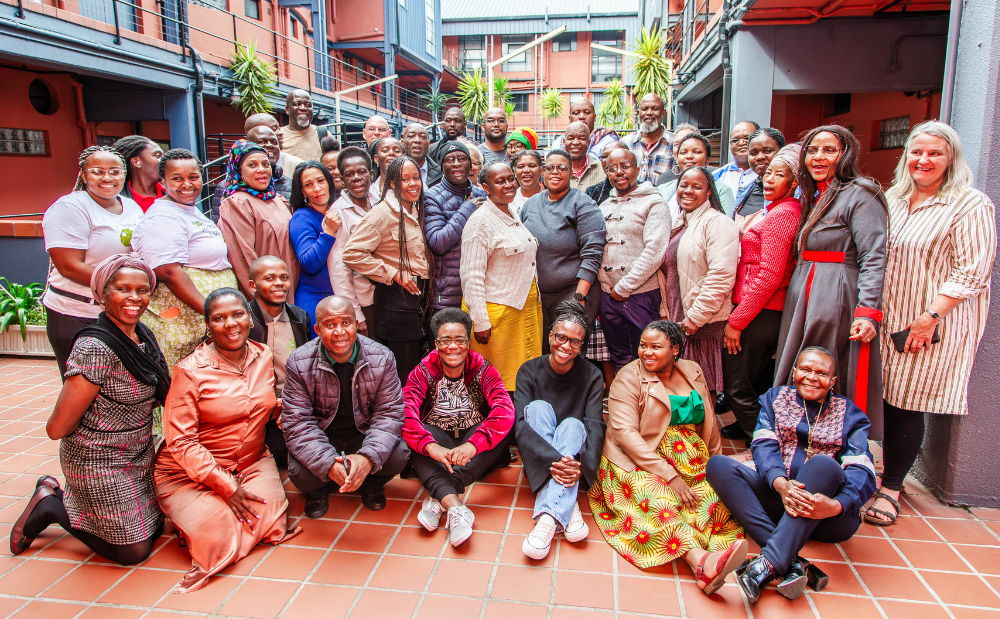SAFCEI launches its second FLEAT workshop in South Africa
- Published:

We launched our second South African FLEAT cohort (FLEAT SA II) with a three-day in-person workshop at the Cape Town Lodge from 21-23 May 2024, with 40 faith leaders (23 women, 17 men) from 8 South African provinces. Faith leaders represented Christian, Muslim, Rastafarian and African Traditional faiths and came together to learn about food and climate justice, through the lens of agroecology. Participants committed to undertaking an eco-action in their communities to share their knowledge and support a transition towards sustainable food and farming systems.
The first three days focused on learning about agroecological principles, mapping out participant’s local food systems, diving into climate change and the current and future impact it will have on our food systems, gaining a better understanding of seed systems, including genetically modified seeds, and delving into animal rights, focusing on caged hens and the cruelty they endure.
Participants had the opportunity to work in groups to design and implement short training sessions, drawing on knowledge products provided to them. These focused on the importance of soil health and making compost and biofertilisers, among others. At the end of the three days, participants designed their own eco-action, gaining insights from others as to how best to design and deliver this in their communities. SAFCEI will support participants in this process, and the outcomes will be shared at the next in-person workshop in October 2024.
A session on the linkages with faith was held each day, with faith leaders highlighting the scripture in their faith texts linked to a mandate to care for the environment and for people. This included the need for food to be clean – to be produced in a way that was ethical and that did not contain chemicals that could harm human health. On 22 May, an interfaith dialogue on livestock welfare and live transport was held in the early evening. This event was also open to the public and a total of 87 people attended. The panel comprised Tahirih Mathee (Brahma Kumaris), Sh Achmad Sedick (Muslim), Braam Hanekom (Christian/Dutch Reformed Church), Tozie Zokufa (African Traditional), and Elisa Galgut (Jewish), each of which spoke about their faith perspective on this issue.
The three-day learning workshop was followed on 24 May with a Wild Food Walk and Food Jam at the Sustainability Institute, outside of Stellenbosch. The walk was led by Loubie Rousch who explained the various culinary and medicinal benefits of the wild foods planted out in the Sustainability Institute’s gardens. Participants were also taken on a tour of the Sustainability Institute and its Lynedoch Ecovillage, comprising homes made from natural materials.
This in-person workshop is the start of an agroecology series for this group; it will be followed by three webinars over the coming months and culminate in another in-person workshop in October 2024. It is hoped that this will lay a strong foundation for faith leaders to raise awareness of the need for food and climate justice in South Africa, and to lead their communities in action to bring about sustainable systems in the country.
The faith leaders evaluated the training workshop expressing appreciation for the opportunity to share experiences and lessons together.
Click hereto read the FLEAT SA II Communique.
Who we are

SAFCEI (Southern African Faith Communities’ Environment Institute) is a multi-faith organisation committed to supporting faith leaders and their communities in Southern Africa to increase awareness, understanding and action on eco-justice, sustainable living and climate change.
Featured Articles
-

South Africa: Who Ends Up Paying If DMRE Cooks the Price of Nuclear Power?
-

South Africa’s nuclear energy expansion plans continue to draw criticism, environmental NGOs chew over legal challenge
-

Earthlife Africa and SAFCEI respond to latest unsettling nuclear news regarding the ministerial determination
-

Open Wing Alliance Africa (Virtual) Summit 2023
-

The Green Connection and SAFCEI respond to energy minister's divisive and deflecting comments
-

Job Vacancy: FLEAT Coordinator







